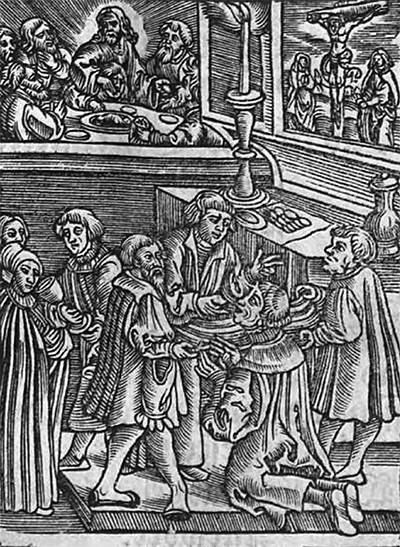Back to the Catechism: The Sacrament of the Altar
This article reflects on the section of Luther’s Small Catechism dealing with the Sacrament of the Altar. Read the relevant portion online in contemporary English here.
Christ’s Body and Blood
by Edward G. Kettner

The Sacrament of the Altar. Woodcut from the 1558 edition of Luther’s Small Catechism.
The sixth chief part of the Small Catechism is titled “The Sacrament of the Altar.” Other names have been applied to it as well. It is often, and probably most popularly, called “The Lord’s Supper,” since it was instituted by Christ with His own words at the last meal He ate with His disciples before His death. It has often simply been called “Holy Communion,” since St. Paul reminds us that the bread is a communion in the Body of Christ and the cup is a communion in the Blood of Christ (1 Corinthians 10:16-17). Luther had no problem in referring to the entire service as the Mass, as had been done for centuries, provided that the service be stripped of all thought that this is a re-sacrifice of Christ necessary to complete the work of forgiving our sins. The idea that Christ was being sacrificed once again by the priest at the altar Luther rightly considered to be an “abomination.”
But if Christ is not being sacrificed anew, why is it called the Sacrament of the Altar? We see something new going on here, in that while a sacrifice is performed by a priest toward God, here the process is reversed; here we have a sacrament, an act performed by Christ, given to us for our benefit. This act gives us the benefits of that sacrifice that was performed once for all. Here, in the eating and drinking of Christ’s Body and Blood, we receive the sacrifice that was performed on Calvary, eating the very Body that was given over to death on the cross and drinking the very Blood that was shed on that same cross for the forgiveness of our sins.
Here, in the eating and drinking of Christ’s Body and Blood, we receive the sacrifice that was performed on Calvary, eating the very Body that was given over to death on the cross and drinking the very Blood that was shed on that same cross for the forgiveness of our sins.
When Jesus distributed the cup, He said, “This cup is the new testament in my blood.” By these words He shows that this is His last will and testament, assuring us that “is” means is. The nature of a will is to speak clearly, so that those who receive the inheritance can be absolutely certain about what they are receiving. Therefore, when the pastor says, “This is the true blood of Christ, shed for the remission of your sins,” you can be certain that it is the true blood of Christ, and that it is indeed for you.
Jesus concludes with the words, “This do in remembrance of me.” This does not mean that this is simply a memorial meal, but rather that in the eating and drinking we actually remember what Christ has done for us and what He has promised to give us here: the forgiveness of sins, life, and salvation. As Luther reminds us, “Where there is forgiveness of sins, there is life and salvation.” To remember is to trust that what Christ said stands.
Who is worthy to receive this sacrament? Luther tells us that the one who is worthy and well-prepared is the one who believes the words, “Given and shed for the remission of sins.” In other words, faith is what is necessary. To receive the sacrament unworthily is to receive it without faith and without understanding what is truly given here. In the face of this, Luther and Lutheran churches insist that one not receive the sacrament until they have been properly instructed in the Christian faith and in the meaning of Christ’s words. True faith by its very nature includes repentance, which is accompanied then by absolution. To receive the sacrament and not understand what it means (that is, failing to recognize that it is the true body and blood of Christ) may result in one taking the sacrament to one’s judgment rather than for one’s benefit. All who commune, whether believer or not, receive Christ’s Body and Blood with their mouths. Only those who trust the words of Christ receive them worthily.
Do you shy away from the sacrament because you are overwhelmed by your sinfulness and thus see yourself as unworthy? Be assured that this sacrament most certainly is meant for you, for you, like all sinners, by nature deserve nothing but wrath from God, but by Christ’s work you are deemed worthy—not by your own merits, but by the merits of Christ. Knowing that, you come with a penitent heart to the Lord’s Table and depart in peace and joy, assured once again that those marvelous gifts are indeed for you.
——————-
Rev. Dr. Edward G. Kettner is Professor Emeritus of Systematic Theology at Concordia Lutheran Seminary (Edmonton).
This article is the sixth in a series exploring the six chief parts of Luther’s Small Catechism. See them all (as they are published) here.





